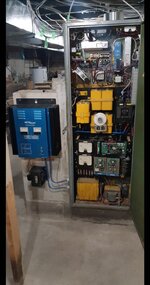Ah,I can chop two biggies easy=Solar Clothes dryer,clothesline, a little warm, grin and bear it, wait a minute-WH, teakettle on a stove thats not heating the ,house.In the winter, stove can heat house and provide hot water and get this cook food!
You already know this, however thats the way I used to live( even carried water- a bit of a hardship OTH keeps you slim) we actually had a 60 amp service to the house, we only used 45 amps, no TV quite often( who needs that garbage anyway?) the "good old days-that were bad" Early to bed, get up before sun to feed cows and start fires. I called my adolescence"Life in the 2.5 world. I had the advantage of being poor so that I could appreciate a better lifestyle, People these days tend to be spoiled, I am now of the opinion if the grid goes down, maybe not 90% of the People would perish first year, probably a large percentage, there are the fighters and jerks( jerks will go fast unless they have a large gang to protect them) Preppers( no cakewalk for them either) those that give up and finally those that cooperate and have a fair IQ. Power is essential for a good lifestyle.




